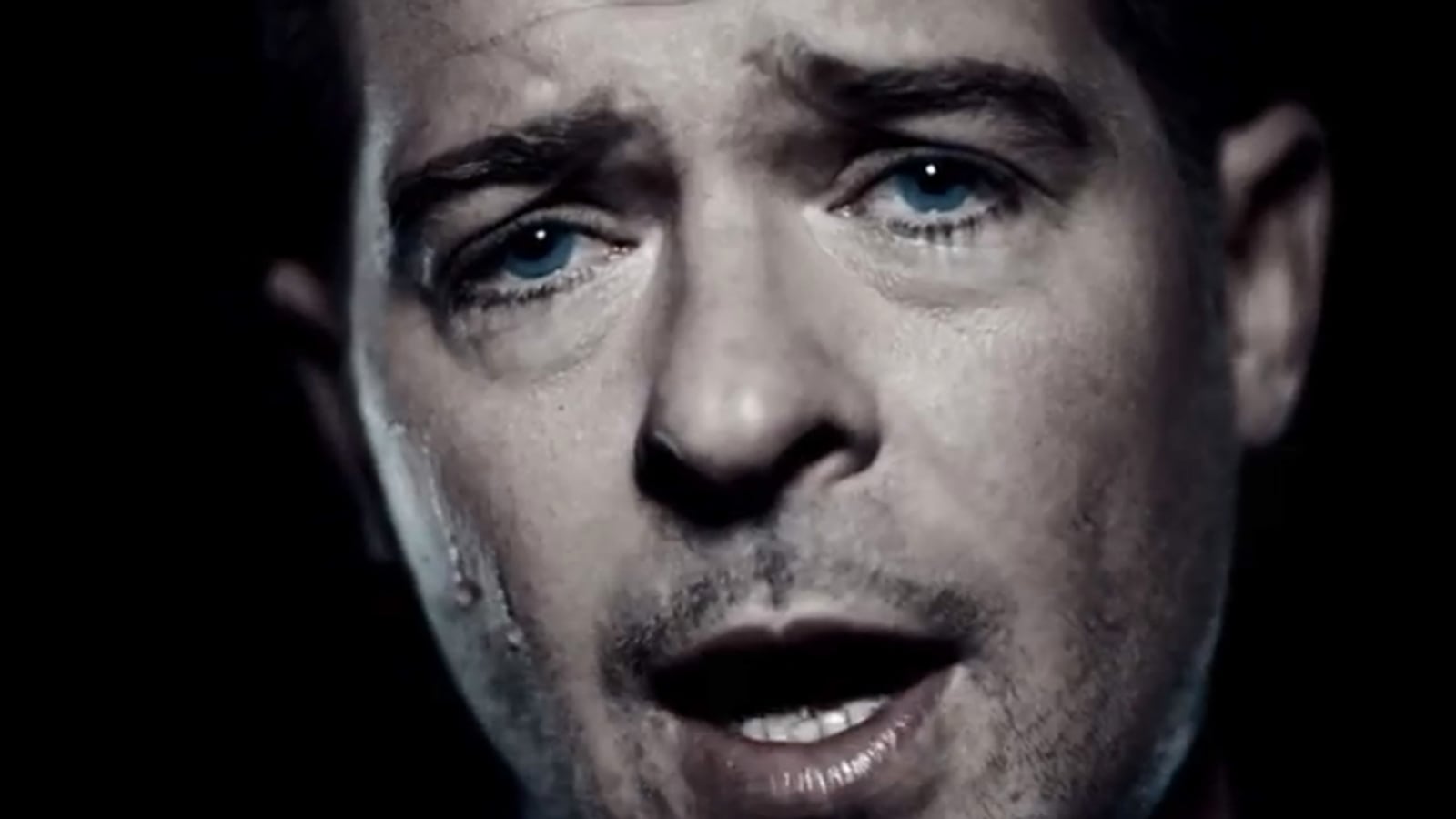The name of Robin Thicke’s new album, out next Tuesday on Interscope, is Paula. Pop connoisseurs the world over are already speculating about who (or what) this enigma of a title could possibly be referring to. Perhaps Robin Thicke has written a suite of songs about racist butter addict Paula Deen. Perhaps he is straight-up obsessed with former American Idol host Paula Abdul. Or perhaps he has some important things to say about cross-dressing 1990s comedienne Paula Poundstone.

All right, all right. Who am I kidding. We all know that Paula is about Thicke’s wife, actress Paula Patton. And how do we know this? Because the guy won’t shut up about it.
In case you’ve been living under a rock on Mars for the past few months, here’s the deal: Thicke and Patton met at an L.A. hip-hop club called Balistyx when they were teenagers. They started dating a couple of years later. In 2005, they were married; in 2010, they had a son, Julian Fuego Thicke. Then Thicke was photographed grabbing this woman’s toches after the 2013 MTV Video Music Awards show—the one at which he did whatever this is with Miley Cyrus on live TV—and rumors soon began to swirl about the singer’s fondness for having sex with ladies who are not his wife. Thicke and Patton finally separated in early 2014.
But the saga doesn’t end there, because Thicke has refused to go gentle into that good night. In fact, he has spent the rest of 2014 publicly pleading with Patton for forgiveness. He cried during a concert in Fairfax, Va. “For y’all that don’t know, me and my wife separated,” he said on stage. “But I want everyone here to know that I’m trying to get my girl back.” He did the same thing at Madison Square Garden a few weeks later. And this week he released a video for Paula’s lead single, “Get Her Back,” that prominently features a bunch of (possibly real?) SMS exchanges superimposed over his sad, bloodied face. “I wrote a whole album about you,” says one of Thicke’s messages. “I don’t care,” replies “Paula.”
But should we care? That’s the question now. Paula won’t be available to the public for another five days or so, but I’ve spent the last 24 hours listening to an advance copy of the album and trying to figure out whether Thicke’s new music is any good. My first impression? Not really. But that doesn’t mean the record isn’t interesting.
It all depends on what you’re hoping to get out of it, I suppose. If you’re a gossip hound looking for new info about the Patton-Thicke split, there’s certainly plenty of confessional dirt here. Despite all the whispers, for example, Thicke hasn’t actually confessed, at least not publicly, to cheating on his wife of nine years. But he does on Paula. “If she ever knew that I would never be the man I promised I would be,” he sings on the 1990s pop ditty “Opposite of Me.” “If she ever knew that I would be running ’round, she never would have stayed.” Seems pretty cut-and-dried to me. Thicke alludes to his transgressions elsewhere as well, apologizing for his “lack of self-control” on “Still Madly Crazy” (“You’d think by now I might have grown,” he adds) and bemoaning the “bird that flew in the window, took a picture, and left with a naughty tweet” on “Something Bad.” Seems that Thicke was “someone like [Patton’s] dad”—a possible philanderer, given to “reward[ing] her with drunken rants” (“Opposite of Me” again).
“Black Tar Cloud,” meanwhile, makes it clear that something more serious than alcohol may have also contributed to the breakup. (Black tar is a kind of heroin, and Thicke has admitted, “I never met a drug I didn’t like.”) “Yelling and screaming and smacking me,” Thicke half-raps on the dark, paranoid track. “How could you do this, you spoiled little rich kid?” He goes on to describe a violent domestic squabble: a “bashed” car, a “smashed” guitar, “swinging” golf clubs, a suicide scare, 911, and Thicke “self-sabotaging the one thing that always made life seem OK.”
“The world can be such a lonely place,” he continues on “Love Can Grow Back.” “Sometimes you need a new drug.”
If you’d rather, however, see Paula as a cautionary tale about gender, narcissism, celebrity culture, and what not do when someone dumps you, there’s plenty of that here, too. Thicke seems to think Paula is all “about” Patton, but really, it’s all about him—his self-flagellation, his mea culpas, his pleas, his epiphanies. “I never should have raised my voice or made you feel you so small,” Thicke purrs on “Get Her Back.” “I never should have asked you to do anything at all.” (Really, nothing at all?) “I should have bought you roses, Good & Plenty, and rubbed your toeses [sic],” he adds on “Too Little Too Late.” On several songs, Thicke has female backup singers voice what he imagines to be Patton’s perspective—“I kept trying to warn you that you were slowly breaking my heart”; “You’ve been such a bad baby”—in a convoluted musical attempt to show that he, you know, empathizes.
But the problem isn’t so much the silliness of specific lyrics as the solipsism and immaturity of Thicke’s whole message. Breakup songs are one thing; breakup songs with such a relentless real-life agenda are another. Judging by Paula, Thicke seems to think that he is entitled to a reunion with his wife if his gestures are grand enough, his apologies public enough, his self-flagellation severe enough—in short, if he earns it. This is an issue with men in general: the misogynistic failure to accept that “other people’s bodies and other people’s love are not something that can be taken nor even something that can be earned” but rather things that “can be given freely, by choice, or not.”
On the other hand, Thicke also seems to see Patton largely in terms of a) sex and b) how she makes him feel. “Your legs are on my walls / Your body’s on my ceiling” is how he verbalizes her absence on “You’re My Fantasy.” “When you come back we’ll have so much fun,” he continues on “Love Can Grow Back.” “With your new nails on my back you’ll be scratching, scratching my itch.” Ultimately, the sense you get is of a guy who doesn’t know the difference between being a good pickup artist and being a good husband.
That said, an album isn’t a gossip mag or a sociological treatise; it’s a collection of songs. I actually think that despite all of the weirdness I catalogued above—or even, perhaps, because of it—Paula could have been a much better record than it is. There’s no rule that says a pop star has to be correct or sympathetic to be entertaining; in fact, the more indulgent, revealing, and/or transgressive an artist is—the more passionate, really—the better shot he or she has of connecting. And Paula is certainly passionate.
The problem is that it’s also a muddle. Thicke is too much of a pop artist—too concerned with hit-making—to fully follow his muse, and too heated, at least at the moment, to take his time and find the ideal form for his feelings. I admire a lot of things about Paula: Thicke’s elastic, throaty voice; the untamed specificity of “Black Tar Cloud”; the stripped-down, open-mic-night production of “Get Her Back,” “You’re My Fantasy,” and "Lock the Door.” But most of the LP feels undercooked: the aimless samba of “You’re My Fantasy”; the grating Louis Prima-meets-Stevie Wonder jumble of “Living in New York City”; the second-class Etta James act of “Love Can Grow Back”; the incongruous Steppenwolf vibe of “Something Bad”; and the painfully hokey Frank Sinatra parody “Time of Your Life.” As a whole, Paula is neither catchy enough for the charts nor inventive enough to justify its shortage of hooks.
The exceptions prove the rule. My two favorite tracks on the LP are the only two that successfully avoid this middle-of-the-road approach. “Still Madly Crazy” is a fairly typical piano ballad that nonetheless transcends the genre for two reasons. Not only is the melody—a delicate, aching sequence that sounds as nostalgic as the lyrics it’s paired with—both beautiful and memorable; the song itself moved me. “Under sunshine, too much wine, laying in the grass, you were all mine,” Thicke recalls at one point. “Every night you’d close your eyes on my chest like it’s home,” he remembers a little later. For once he’s actually singing about Patton: what she was like, why he loved her. He’s finally showing, not telling. I got the chills.
“Tippy Toes” couldn’t be more different. It’s a proudly idiotic party song about a hottie who “doesn’t want to be like anyone else”—who “can twerk but [would] rather dip bounce and bust.” More importantly, it cleverly updates the classic Chubby Checker playbook to create an utterly addictive number with zero emotional content that might actually have a shot—unlike the rest of the LP—at getting people out on the floor this summer. “Tippy Toes” is the kind of fun, shallow hit that could inspire an old-school dance craze, and there’s absolutely nothing wrong with that.
Unfortunately, the rest of the album isn’t as strong. Which is too bad, because Thicke’s weird passion project had promise. In March 1977, Marvin Gaye was going through a divorce from his then-wife Anna Gordy Gaye. After his attorney convinced him to end the lengthy proceedings by giving Anna half of the royalties from his next album, he entered the studio assuming that he would just do a “quickie record—nothing heavy, nothing even good.” But Gaye wound up creating something “out of deep passion”; he “sang and sang,” he said, “until I drained myself of everything I’d lived through.” He didn’t have an agenda. He didn’t even rush to release the recordings, waiting more than a year to finish them off. But the result of his efforts—1978’s Here, My Dear—is legendary: a strange, messy, wounded, and almost unbearably personal album that somehow captures all of the emotions that accompany the end of a marriage—sincerity, sarcasm, tenderness, fear, anger, regret, and regeneration.
Plenty of listeners will point to Paula as proof that Robin Thicke is a narcissistic, self-serving jerk. Others might say that he’s shown his softer side—that he deserves to get the girl back. But in the end, who really cares? Marvin Gaye wasn’t a better man than Robin Thicke. He was just a better artist.






